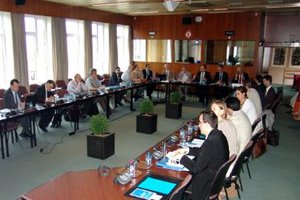News
Budapest Platform seminar
July 2013
The Budapest Platform organised a seminar on 2 July at the Union Benelux headquarters in Brussels on the role of the national level in supporting cross-border cooperation.
This first public event since the formation of the Platform was a success. The participants were able to obtain a better understanding of the experiences of four countries, France, Germany, Hungary and the Netherlands, and hear the points of view of the DG REGIO, the Council of Europe and the Committee of the Regions.
The representatives of the countries took it in turns to present their experiences of cross-border cooperation:
- for Hungary, Bence Rétvari, Secretary of State for Public Administration and for Justice, reviewed the essential role played by his ministry in the coordination of the various cross-border cooperation instruments, with support from the CESCI (Central European Service for Cross-border Initiatives - www.cesci-net.eu);
- for the Netherlands, Tom Leeuwestein, unit head at the Ministry of the Interior and Kingdom Relations, explained that the Dutch government has set up a technical unit tasked with settling cross-border disputes involving the national level;
- for France, Jean-Luc Frés, DATAR desk officer, explained that France wished to reinforce its coordination with neighbouring countries (coordination of the partnership agreements on each border, cross-border statistical monitoring), supported by the MOT;
- for Germany, Dr Gerd Hager, executive director of the Regionalverband Mittlerer Oberrhein, described the role of the BBSR (Federal Institute for Spatial Planning) in monitoring cross-border questions and its support for the emergence of IMEG, the German network of cross-border metropolitan regions.
Colin Wolfe, for the European Commission, stressed that the territorial approach must be implemented at the political level and that the Member States must work with their neighbours on ensuring consistency in the planning of their border regions.
The conclusions of the seminar:
- the multi-level approach is necessary for satisfactory operation of cross-border cooperation;
- an integrated territorial approach must stimulate the conventional project-based approach in the border areas;
- the integrated strategies must be based on local cross-border data (cross-border flows, etc.) which are not available at the moment;
- border regions are confronted with specific problems, caused for example by the differences between the legal systems across the border.
The objective for the Budapest Platform is to reduce the frequency of these problems, which arise at local level but can be resolved only at State level, through better coordination between neighbouring States, supported by the European Union.
The Budapest Platform was formed in December 2010 between the representatives of organisations involved at national level in cross-border cooperation.
Back to list
